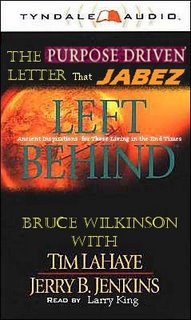 Said at Southern
Said at Southern officially begins today
What's that? Is road racing expert and NASCAR moonlighter
Boris Said answering a dramatic call to the Christian ministry? Afraid not, dear friends. Said at Southern is just the new communal blog site that hosts the blogs of various students and alumni at The Southern Baptist Theological Seminary.
As for Boris, I guess he'll just have to keep on trying to qualify for those NASCAR races. Had he indeed put in his application for SBTS, he would have joined
Brian Vickers as the second
NASCAR name to be associated with both racing and theological education. Boris Said is staying put for now. Which, I expect, will keep this fellow happy.


Boris' decision to stay in racing will also be good news to his sponser, SoBe. That's the company that makes the
SoBe No Fear energy drinks.
Speaking of energy drinks, I tried the new
Mountain Dew amp Overdrive for the first time today. It's Pepsi Co.'s answer to Red Bull, and the can promises to provide an "intense cherry hit" so that I can "live life louder!" What did I think? Well, it tasted fine (better than Code Red Dew but not quite as good as regular Dew IMO). It actually tasted
pleasant and
relaxing, something I don't think the marketers of the drink are aiming for. For pete's sake, the can has a warning label on the back that says, "Not recommended for children, pregnant women or people sensitive to caffeine. THIS PRODUCT IS NOT INTENDED TO DIAGNOSIS, TREAT, CURE OR PREVENT ANY DISEASE." And make sure you note that last sentence (as if ALL CAPS weren't enough), because anytime something sooo00OOO out there in left field is printed on products you can bet that some ignoramous has already done it and sued the company over it.

Anywho, the real question is will MD amp Overdrive replace my habitual craving for original recipe
Mountain Dew. Well, let's compare the stat sheet:
Mountain DewPrice: 75 cents - $1.00 per can
Calories: 170 per serving
Carbs: 46 grams
Sugar: 46 grams MD amp OverdrivePrice: $2.00 -$2.25+ per "Tall Boy" can
Calories: 110 per serving
Carbs: 29 grams
Sugar: 29 gramsOkay, hold the phone! Something that sells itself as an "energy drink" has no business getting out preformed by plain soda pop in the sugar count (granted Overdrive does win nearly 2-1 in the caffeine ratio). The taste seems more sour than sweet to me. Imagine putting
Sour Punch Straws in your Dew and you'll get my impression.


In fact, these statistics might lead you to assume MD amp Overdrive is actually a healthy beverage alternative to soda. That is, until, you check the rest of the ingrediants on the can. For instance, the label promotes itself as containing: B vitamins (sounds good, right?), Guarana Extract (doesn't sound so good, does it?), Taurine, Ginseng (isn't that what we use to clean the sink?), and Maltodextrin (I don't even want to know). Now if you bother to read the "Supplement Facts" on the back of the can, you will see that the Food and Drug Administration has no idea how much Guarane, Maltodextrin, Taurine, etc. is needed for a daily diet value. Thus, the good people at Mountain Dew are making us into the FDA's test subjects to see what this stuff actually does to the human body. Sounds fun, right? Maybe that's what the "
Intense Cherry
Hit" is supposed to mean!
In the end, I found MD amp Overdrive to be a pleasant drink to accompany my turkey sandwich down my digestive track. it gets a B+ for taste. It fails, however, to deliver on its promise of allowing me to "live life loud!" Red Bull doesn't taste as good as amp, but it actually alters my sensory functions for a short time. False advertising is a major deficiency, so amp Overdrive gets a C- in its purpose. I think Pepsi Co. needs to drop the gimmicky approach and just promote amp as a Mountain Dew soda like Code Red. Amp needs a reasonable price and a new packaging to fulfill its potential. Final grade (not an average score): B.
So, in conclusion, all I'm really trying to say is visit
Said at Southern to see some of the finest young minds express themselves on the internet. Saidatsouthern.com is an alternative to the oft-malfunctioning
sbtsblogs.net, which essentially deletes people from the main page if they upgrade from old blogger formating to new blogger formating. Strange, isn't it?
P.S.
For more reviews of Energy drinks, check out Energy Drink Ratings blog (its the place where I got the picture of the amp Overdrive can).

 President Putin, I suspect, will discover as I have that living with the burden of representing Time for a whole year will lead to immense bouts of self-doubting and anxiety. Once people associate you with "Person of the Year," it becomes difficult to meet their expectations. Yet, in spite of the tribulation, I do not regret the journey. Like an Olympian, I pass this prestigious torch. Though my light may fade from the public scene, we can only hope and pray that Putin's lantern has only begun to show us the way for a better 2008.
President Putin, I suspect, will discover as I have that living with the burden of representing Time for a whole year will lead to immense bouts of self-doubting and anxiety. Once people associate you with "Person of the Year," it becomes difficult to meet their expectations. Yet, in spite of the tribulation, I do not regret the journey. Like an Olympian, I pass this prestigious torch. Though my light may fade from the public scene, we can only hope and pray that Putin's lantern has only begun to show us the way for a better 2008.
























